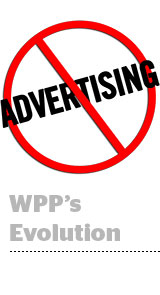 Here’s today’s AdExchanger.com news round-up… Want it by email? Sign-up here.
Here’s today’s AdExchanger.com news round-up… Want it by email? Sign-up here.
Ad World Tectonics
“We’re not in the advertising business anymore,” said Sir Martin Sorrell late last week at the Guardian Changing Media Summit. Sorrell describes a two-pronged change for the industry: The first is a reliance on a much wider mix of services (particularly looping in tech and data on top of legacy creative and media expertise), and the second is business “short-termism” as marketers take a more narrow, project-driven approach, which Sorrell attributes in part to the broader economic slowdown. Read on at The Drum.
No Time Like The Present
What’s been the engine of TV marketing in the face of channel fragmentation? Live sports and event programming. And the same is proving true in the digital sphere. “Live is having a moment,” writes Tarikh Korula, CEO at the real-time analytics firm Seen, in a TechCrunch column. From platforms like Twitch and Snapchat that are zooming through puberty to Twitter Periscope, Facebook Live and the soon-to-come YouTube Connect, the future of marketing isn’t just finding the right moment, it’s finding this moment right now.
Boosting The Content
The Associated Press has been posting sponsored tweets for years, and nobody begrudges the institution this small revenue stream, but one tweet from last Friday seems different. Windex tapped BuzzFeed to produce a sponsored listicle to piggyback on the premiere of “My Big Fat Greek Wedding 2” (which has some Windex references, in case you forgot), and then paid AP to push out the BuzzFeed post. More at Adweek. Strong publisher ties are ever more important in the social age.
Old School
Pitney Bowes built an empire out of postage meters. Now it’s pitching itself as an ecommerce logistics and business service provider [AdExchanger coverage]. The Wall Street Journal says, “It’s a pivot many companies are facing as they watch decades-old business models crumble in the face of online competition.” These companies (including FedEx and the Postal Service) have global reach and consumer touchpoints, which is something ecommerce brands or retailers can’t immediately replicate. Pitney Bowes bought the ecommerce services company Borderfree for $381 million last year, and uses it to, for example, allow retailers to display online prices in local currencies and understand cross-border shipping timetables. More.
But Wait, There’s More!
- The Rise Of The Platform Publishing Specialist – WSJ
- Is TV Still The Key Influencer Of Voter Behavior? – The Street
- How The Internet Lost Its Free Spirit – The Economist
- Microsoft Would Back A Potential Yahoo Buyer’s Bid – Re/code
- New Ad Tech Format Co. Hopes Moat Will Prove Performance – release
- RadiumOne “State Of Mobile Acquisition Report” – release
- We’re More Honest With Our Phones Than With Our Doctors – NYT












